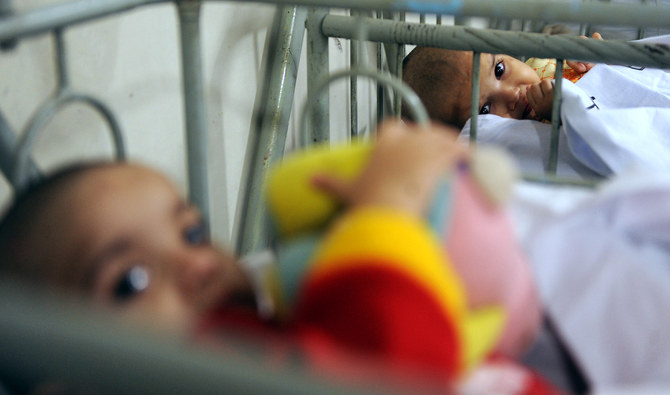KARACHI: Pakistan plans to encourage the use of contraceptives to bring down its current population growth rate from 2.4 percent to 1.1 percent by 2030, a senior official told Arab News on Tuesday.
The country has developed a National Action Plan (NAP) to implement the recommendations of the Council of Common Interests (CCI) approved in 2018 to address the challenge of population growth.
“The plan consists of various components, such as population fund, legislation, curriculum and trainings, and talking to ulema [or religious scholars],” Dr. Shahid Hanif, Director General of the Population Program Wing (PPW), said.
It also seeks to increase the present contraceptive prevalence rate (CPR) of 34 percent to 50 percent by 2025 and 60 percent by 2030 to lower the existing average population growth rate of 2.4 percent to 1.5 percent by 2025 and to 1.1 percent by 2030. Officials say they hope to achieve these targets by reducing the present fertility rate of 3.6 births per woman to 2.8 births by 2025 and 2.2 births per woman by 2030.
At the current rate, the annual population grows by an average of more than five million newborn babies per year. After the growth rate is brought down to 1.1 percent, however, the average addition would be down to 2.3 million on an annual basis, keeping in view the country’s current population of 211.17 million.
The country’s federal and provincial administrations are taking steps to ensure universal access to family planning and reproductive health care services. The federal government wants to create a five-year non-lapsable special fund to reduce the population growth rate with an annual allocation of Rs 10 billion. The fund will be set up exclusively from federal resources without any cut from the provincial funds, according to the latest Economic Survey of Pakistan.
“Provinces have been given funding for more lady health workers and commodities [contraceptives] since the federal government will provide a matching grant to them,” Hanif said
One of the functions of the Population Program Wing is to ensure contraceptive commodity security, supply chain management and warehousing of contraceptives for provincial and regional population welfare departments.
A Contraceptives Commodity Security Working Group (CCSWG) has also been established to ensure the availability of birth control commodities, their timely procurement, pooled distribution, stock assessment and data availability etc
“With a manageable population, we will be able to utilize our resources more effectively for the welfare of people and our national economy. This is important since about two-third of Pakistan’s population is below the age of 20. These people need education, health and other facilities. If these individuals don’t get basic necessities, the country may witness huge social disruption in the future,” Hanif added.
However, he categorically ruled out that the country was considering “one child” policy, saying “it was never discussed nor thought about.”
The reduction of maternal mortality rate from 170 to less than 70 per 100,000 live births by 2030 is also among the objectives of the plan.
Use of contraceptives to bring down Pakistan's population growth rate to 1.1% – official
https://arab.news/83zu3
Use of contraceptives to bring down Pakistan's population growth rate to 1.1% – official

- More than five million babies are born in the country every year
- Pakistan also plans to reduce maternal mortality rate from 170 to less than 70 per 100,000 live births by 2030
India captain says will travel for Pakistan clash despite boycott

- Pakistan have announced they will boycott their match against India on Feb. 15 in Sri Lanka
- India need to be at the stadium on Feb. 15 to ensure they are awarded two points for match
MUMBAI: India captain Suryakumar Yadav said Thursday that his team would show up in Colombo for their T20 World Cup clash against Pakistan, despite their Group A opponents and arch-rivals boycotting the match.
“We haven’t said no to playing them (Pakistan),” Yadav told reporters at Mumbai’s Wankhede stadium, where India will begin their campaign against the United States on Saturday’s opening day.
“They are the ones who have said no. Our flights are booked and we are going to Colombo.”
India need to be at the stadium and ready to take the field for the February 15 match in order to make sure of being awarded the two points for a match forfeit.
The tournament, co-hosted by Sri Lanka and India, has been overshadowed by weeks of political posturing in the build-up.
Bangladesh were kicked out for refusing to play in India and Pakistan’s government then told its team not to show up at the clash of the arch-rivals as a show of support for Bangladesh.
Pakistan and India have not played bilateral cricket for more than a decade, and meet only in global or regional tournaments events.
India start the T20 World Cup on home soil with a great chance of retaining the title they won two years ago and Yadav agreed they were the side to beat.
“The way we have been playing, it looks like we are the favorites,” he smiled.
If that seemed like an overconfident statement, the India captain was quick to caution: “There are 19 (other) good teams in the tournament, though.
“On a given day, when you play, you have to bring your A-game and play good cricket.”
India know that their opening opponents, the United States, caused the biggest upset of the 2024 tournament when they beat Pakistan in a super over.
Yadav said no team would be taken lightly.
“I’m sure every game will be very important,” he said.










